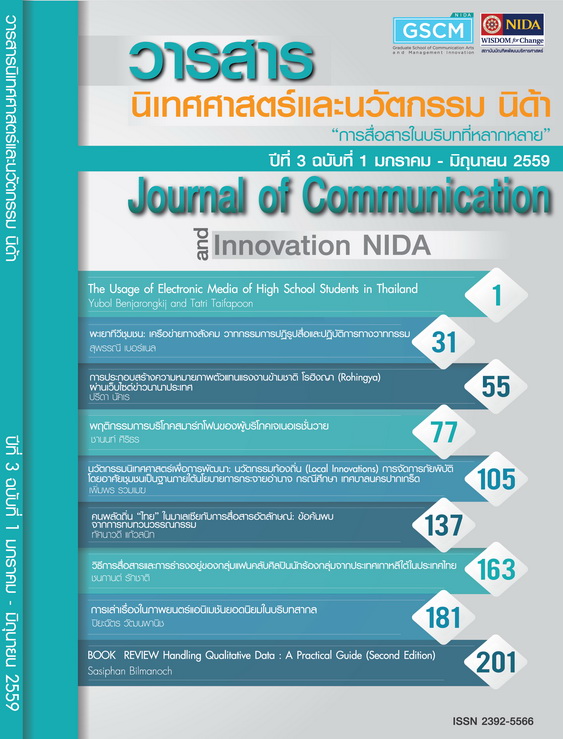การประกอบสร้างความหมายภาพตัวแทนแรงงานข้ามชาติ โรฮิงญา (Rohingya) ผ่านเว็บไซต์ข่าวนานาประเทศ
Main Article Content
Abstract
เนื่องจากกระแสข่าวแรงงานข้ามชาติ โรฮิงญา (Rohingya) เป็นปัญหาที่ส่งผลกระทบต่อความรู้สึกของคนทั่วโลก มีการนำเสนอข่าวเกี่ยวกับความทรมาน ความอดอยาก ของกลุ่มคนดังกล่าวที่ต้องอาศัยอยู่บนเรือโดยไม่มีการยอมรับของประเทศใด ๆ นานาประเทศต่างผลักดันให้เรือของโรฮิงญาออกไปในเขตทะเลสากล หรือในน่านน้ำของต่างประเทศ โดยพยายามปกป้องน่านน้ำตัวเองอย่างหนาแน่น เพราะไม่มีใครที่กล้ารับภาระที่ไม่รู้จบ
หากติดตามข่าวอย่างต่อเนื่องจะพบว่าเครือข่ายออนไลน์ที่นำเสนอข่าวสารไปทั่วทุก มุมโลก ล้วนแล้วแต่มีความหลากหลาย และมีวัตถุประสงค์เพื่อสร้างพื้นที่สาธารณะในการสื่อสารที่สามารถทำให้ประเทศและวัฒนธรรมต่างๆ มาอยู่ด้วยกันในเวลา 24 ชั่วโมงตามหลักการไหลของข้อมูลข่าวสาร (Castells, 2013, 123) ดังนั้นเหตุการณ์ความเคลื่อนไหวของแรงงานข้ามชาติ โรฮิงญา (Rohingya) ในช่วงเวลานี้ (2015) จึงส่งผลกระทบต่อหลายๆ ประเทศทั้งที่เป็นประเทศเกี่ยวข้องโดยตรง เป็นประเทศต้นตอของปัญหา หรือเป็นประเทศที่มีภาพของการเป็นชาติที่มีมนุษยธรรมสูง ที่ต้องมีคำตอบ แสดงจุดยืน หรือแสดงความรับผิดชอบให้สังคมโลกได้รับรู้ผ่านสังคมเครือข่ายออนไลน์อย่างรวดเร็ว
Rohingya immigrants were covered in the news through publicity in international websites. As a result people were quickly exposed to this news and became frustrated quickly. The news coverage showed a number of asylum seekers who were sick and dead, lacked foods and drinks. Most were in dire helplessness. These people needed food, housing and jobs for their family in the future. However, neighboring countries still denied entry to these people and left them seeking a destination that would accept them. The main purpose of Rohingya immigrants news was made in the public sphere in communications in which many countries and cultures are tied in the same flow of information (Castells, 2013, p.123). Rohingya immigrants called for countries that would respond to their pleas for help. The voices requesting human rights treatment were even louder in the networked societies. As a consequence, many countries had to accept these people despite the hardship to be spared the label of being inhumane. This is a reflection of the power of the networked society.
Article Details
ข้อความและความเห็นในวารสารนิเทศศาสตร์และนวัตกรรม นิด้า เป็นของผู้เขียนแต่ละท่าน มิใช่ของคณะนิเทศศาสตร์และนวัตกรรมการจัดการ สถาบันบัณฑิตพัฒนบริหารศาสตร์


